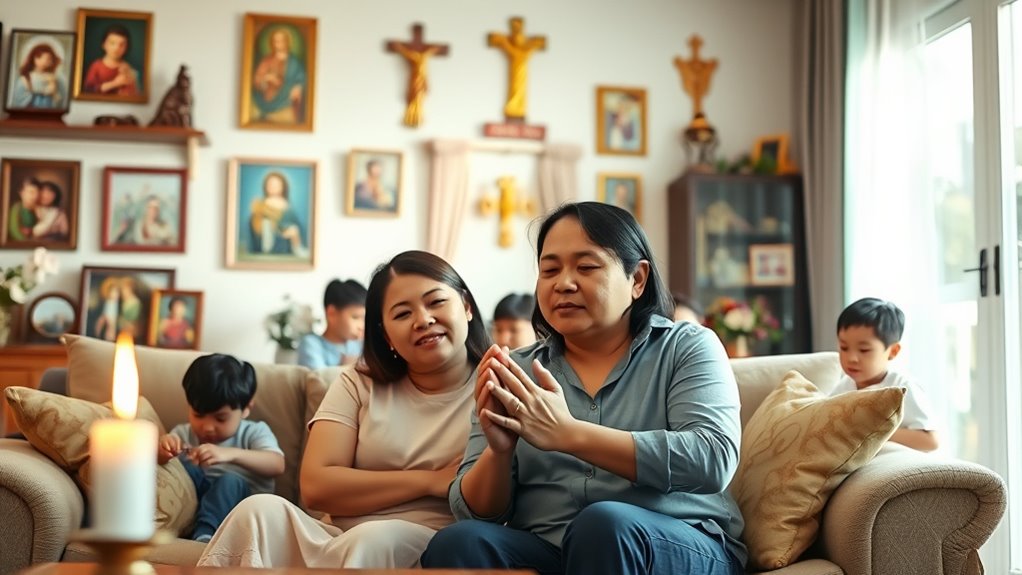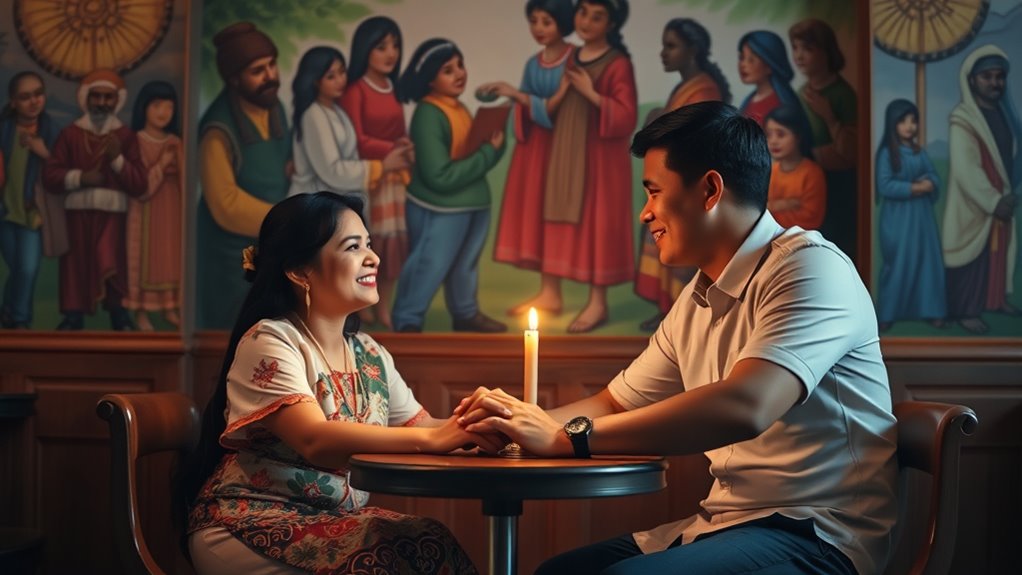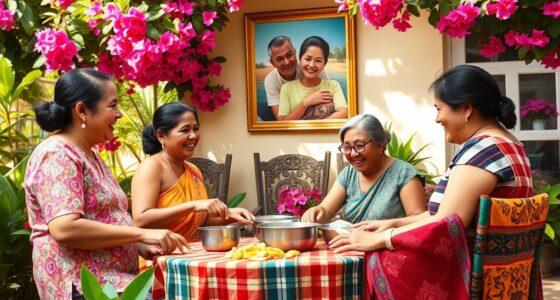Filipina women appreciate partners who share their faith because it deepens emotional connections and enhances relationship stability. Shared beliefs foster trust and make communication easier, which leads to fewer conflicts. Faith also plays an essential role in family dynamics, guiding values and traditions. This common ground strengthens family bonds and encourages mutual support. When you align spiritually, it creates a solid foundation for steering through life’s challenges together. Discover more about the significant role of shared faith in relationships.
Key Takeaways
- Shared faith fosters deeper emotional connections, enhancing relationship stability and satisfaction among Filipina women.
- Cultural significance of faith in Filipino identity strengthens family dynamics and personal commitments, leading to a preference for like-minded partners.
- Partners with shared beliefs experience fewer conflicts, improving communication and conflict resolution in relationships.
- Shared faith provides a common foundation for raising children, aligning parenting styles and values within families.
- Emotional support derived from common beliefs creates a strong bond, enabling couples to face challenges together with confidence.
Strong Catholic Influence on Relationships

While you may find that relationships in the Philippines are deeply intertwined with Catholic values, this influence shapes everything from family dynamics to personal commitments.
The Catholic Church plays a crucial role in fostering a sense of community, instilling moral values that you likely treasure in your relationships. Monogamy and commitment, emphasized in Catholic teachings, form the bedrock of relationship expectations, making lifelong partnerships a cultural norm. Additionally, the Church’s historical involvement in promoting human rights has impacted the way relationships are viewed, encouraging respect and dignity within partnerships.
Family orientation is essential, reflecting the importance of close-knit ties. Celebrations like Simbang Gabi reinforce family bonding and shared experiences, while moral guidance from the Church helps you navigate relationship challenges.
Family ties are vital in Filipino culture, with celebrations like Simbang Gabi strengthening bonds and providing moral support through the Church.
With around 80% of Filipinos identifying as Catholic, these values deeply permeate societal norms, influencing how you perceive and value your personal relationships.
Communication Styles and Faith Sharing

Shared faith not only reinforces the bonds formed through strong Catholic values, but it also shapes how Filipina women communicate their beliefs. You’ll find that different faith-sharing styles, like storytelling and truth-telling, resonate in various ways. Understanding your audience’s cultural context is key; it helps you establish common ground and build trust. This is particularly true when considering the concept of contagious faith, which emphasizes the importance of connecting authentically with others. Emotional connections through relatable experiences can make your messages more impactful. Also, using both verbal and nonverbal cues enriches the communication process.
Family Dynamics and Religious Connections

Family dynamics in the Philippines are deeply intertwined with religious connections, shaping how individuals relate to one another. In Filipino culture, the family is a core institution, and shared spiritual practices like prayer and Mass attendance enhance unity.
Mothers hold a special place, symbolizing devotion, particularly through the veneration of Mother Mary. This respect for motherhood fosters strong intergenerational ties, as parents model their faith to their children.
Christianity emphasizes family relationships over individualism, encouraging community involvement that reinforces family bonds. By engaging in religious activities, families not only strengthen their spiritual connections but also create positive parenting behaviors, nurturing warmth and hope within the household.
Ultimately, faith becomes an essential thread that weaves families together in meaningful ways.
Emotional Support Through Shared Beliefs

When two partners align on their beliefs, they lay a strong foundation for emotional support within their relationship. Shared values create a deep emotional connection, allowing you to understand each other on a fundamental level.
Trust grows as you both uphold the same beliefs, fostering reliability and a sense of security. This moral alignment means you’ll face challenges together, presenting a united front against external pressures.
When partners share beliefs, trust flourishes, creating reliability and a united front against life’s challenges.
With shared beliefs, conflict resolution becomes easier, simplifying communication and deepening respect between you. Ultimately, these shared values enhance long-term satisfaction, helping your relationship endure through life’s ups and downs.
You’ll find that emotional support is stronger when you both share a common language and understanding, enriching your partnership. Furthermore, persistent feelings of unhappiness can be mitigated by this shared foundation, promoting a healthier and more fulfilling relationship.
Navigating Cultural Expectations Together

Maneuvering cultural expectations becomes essential as emotional support strengthens your relationship. In Filipino culture, family approval is significant, so you’ll likely need to earn the trust of her family.
Embrace family ties and participate in gatherings, as this shows your commitment to the relationship. Respecting elders is important; always demonstrate deference to older family members.
As you navigate traditional gender roles, openly discuss expectations to find a balance that honors both modern and traditional values. Whether urban or rural, understanding these dynamics helps you connect better.
Long-term Commitment and Loyalty

Long-term commitment and loyalty are cornerstones in relationships with Filipina women, reflecting their deep-seated values.
When you seek approval from her family, you’re acknowledging their pivotal role in her life. This commitment signifies genuine care and devotion, which she highly values.
Respecting family hierarchy and traditions is essential, showing that you understand the importance of loyalty. Your adaptability and flexibility in the relationship demonstrate your willingness to grow together.
A strong work ethic not only showcases responsibility but also reinforces your loyalty. In a collectivist culture, prioritizing family and community ties fosters lasting bonds. Understanding the emotional dysregulation that can affect relationships will further enhance your ability to navigate challenges together.
Embracing these values will strengthen your relationship and show her that you’re committed to a future built on trust and devotion.
Spiritual Growth and Mutual Encouragement

As you navigate a relationship with a Filipina woman, embracing spiritual growth together can greatly deepen your bond.
Mutual support in your partnership uplifts both of you spiritually, fostering accountability in achieving your goals. By actively encouraging each other, you’ll reinforce your faith and enhance your spiritual engagement.
Participating in faith-based activities together won’t only strengthen your shared goals but also promote harmony through recognizing each other’s spiritual gifts.
Regular reflection and candid feedback are essential for your growth, while celebrating milestones will solidify your connection.
Embracing challenges together fosters resilience, allowing you both to thrive.
Ultimately, this mutual encouragement cultivates a growth mindset, ensuring you both continue to evolve spiritually and emotionally.
Building a Supportive Community Together

Building a supportive community together can amplify the spiritual growth you’ve both been nurturing in your relationship.
When you engage with others who share your faith, you foster inclusivity and create an environment where everyone feels valued. By encouraging empathy and understanding, members can express their vulnerabilities without fear of judgment, building trust.
Regular participation in faith-based activities deepens connections and enhances mutual accountability, supporting each other’s spiritual journeys.
As you collaborate on outreach programs, you not only strengthen your bonds but also extend your community’s impact.
Frequently Asked Questions
How Do Shared Faith Values Influence Dating Preferences?
Shared faith values greatly influence your dating preferences by fostering deeper connections and understanding.
When you find someone who shares your beliefs, it can simplify discussions about family values, traditions, and even conflict resolution.
You’re likely to feel a stronger sense of unity and purpose in the relationship.
Plus, having common moral frameworks helps you navigate challenges together, making your bond even more robust and meaningful.
What Role Does Religion Play in Conflict Resolution?
Religion often acts as a gentle guiding light in the stormy seas of conflict resolution. It helps you understand differing perspectives while fostering unity among diverse groups.
By promoting shared values, spiritual leaders can inspire forgiveness and dialogue, allowing communities to heal.
You’ll find that these institutions, with their deep local knowledge, play a crucial role in easing tensions and nurturing long-term peace, making them indispensable in conflict resolution efforts.
Are There Specific Religious Practices That Couples Should Adopt?
If you’re looking to strengthen your relationship, adopting specific religious practices can be beneficial.
Consider praying together regularly; it fosters unity and reduces tension. Attending worship services as a couple can enhance your bond and community involvement.
Engaging in spiritual discussions deepens understanding and connection. Additionally, reading scripture together can align your values, helping you navigate life’s challenges side by side.
These practices can create a solid foundation for your relationship.
How Can Partners Support Each Other’s Individual Faith Journeys?
Imagine two trees in a garden, each growing tall yet unique. To support each other, you need to nurture your roots—share your individual faith journeys openly.
Water your bond with empathy and patience, allowing space for exploration without fear. Regularly engage in conversations about your experiences, and participate in spiritual activities together.
Just like trees intertwine their branches, your support can create a strong, flourishing relationship that honors both paths.
What Challenges Arise When Faith Differs in Relationships?
When faith differs in relationships, you face a range of challenges.
Communication barriers can emerge, making it tough to discuss beliefs openly. You might struggle with internal conflicts and feel a lack of shared identity.
Steering through family traditions and community acceptance can also create tension. Additionally, you may find it hard to balance different religious practices and expectations, leading to emotional strain and difficulty providing support during significant life events.
Conclusion
In the end, shared faith can profoundly strengthen relationships, especially for Filipina women who value deep connections. For example, consider Maria and John, a couple who bond over their Catholic beliefs. They attend Mass together every Sunday, fostering emotional support and mutual growth. This shared commitment not only deepens their love but also helps them navigate challenges as a team. By building a life grounded in faith, they create a nurturing environment that enhances their relationship and family dynamics.









